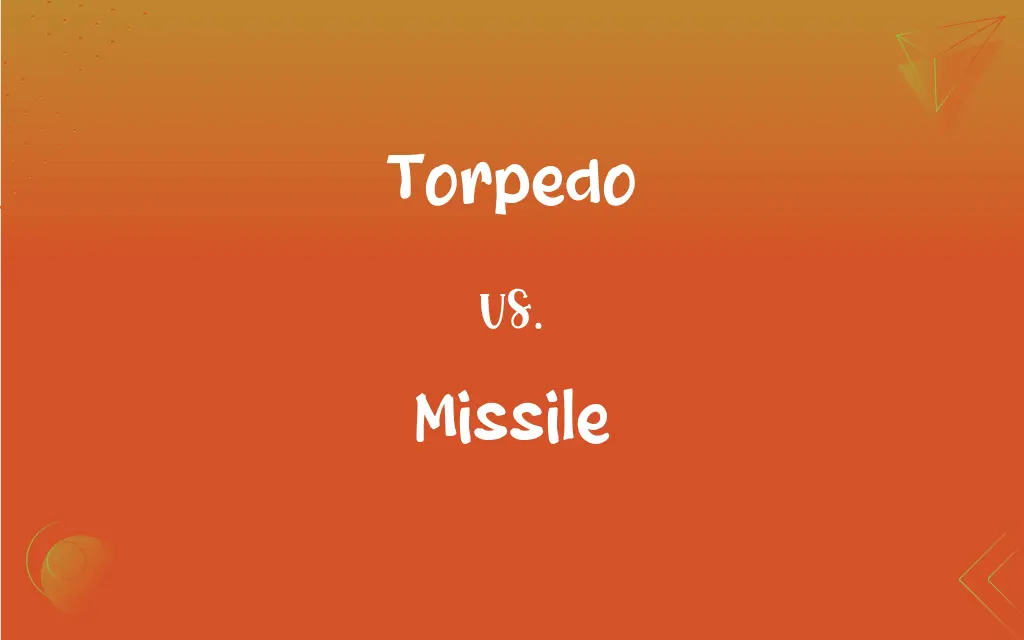Torpedo vs. Missile: What's the Difference?
Edited by Aimie Carlson || By Harlon Moss || Updated on November 12, 2023
Torpedo is an underwater missile designed to detonate on contact or in proximity to a target, primarily used against ships or submarines. Missile is a guided airborne weapon, capable of long-range destruction, used for military purposes.

Key Differences
Torpedoes are specialized underwater weapons, designed to operate in aquatic environments, primarily used to target ships and submarines. They are known for their stealth and are often launched from submarines or ships. Missiles, on the other hand, are airborne weapons, designed to be launched from land, air, or sea, targeting both ground and aerial targets. They cover a broader range of types, including ballistic, cruise, and anti-aircraft missiles.
The propulsion systems in torpedoes are designed for underwater navigation, often using electric or thermal propulsion. Their navigation is geared towards underwater acoustics and can be wire-guided or self-guided. Missiles utilize a variety of propulsion systems, including jet engines and rocket motors, and are equipped with advanced guidance systems like GPS, infrared, or laser guidance, making them effective for long-range and precise strikes.
In terms of size and design, torpedoes are generally cylindrical to navigate underwater efficiently. They are equipped with explosives designed to detonate upon impact or close proximity to a target. Missiles have a more diverse range of sizes and designs, tailored to their specific purpose, whether it’s for short-range tactical strikes or long-range strategic attacks.
The historical development of torpedoes dates back to the 19th century, initially as stationary mines and later evolving into self-propelled weapons. They have been pivotal in naval warfare. Missiles have a broader history, encompassing a range of technologies from simple ballistic projectiles to sophisticated guided systems, integral in modern warfare across all military branches.
Operationally, torpedoes are used in a more specific context, primarily for naval battles and are integral in anti-submarine and anti-surface warfare. Missiles have a wider operational scope, used in various forms of combat including air-to-air, surface-to-air, and surface-to-surface confrontations, making them versatile tools in modern military arsenals.
ADVERTISEMENT
Comparison Chart
Environment of Operation
Underwater
Airborne
Primary Targets
Ships and Submarines
Ground and Aerial Targets
Propulsion and Guidance
Underwater propulsion, acoustic/wire guidance
Airborne propulsion, GPS/infrared/laser guidance
Size and Design
Cylindrical for underwater efficiency
Diverse, based on purpose
Historical Development
19th century, naval focus
Broad history, used in all military branches
ADVERTISEMENT
Torpedo and Missile Definitions
Torpedo
A cylindrical explosive device used in naval warfare.
The destroyer's torpedo sank the hostile submarine.
Missile
A self-propelled airborne weapon, often equipped with explosives.
The fighter jet was armed with air-to-air missiles.
Torpedo
An underwater self-propelled weapon with explosives.
The submarine launched a torpedo at the enemy vessel.
Missile
A guided airborne weapon used for military strikes.
The missile accurately hit its intended target from miles away.
Torpedo
An aquatic military weapon designed to destroy ships or submarines.
Torpedoes are key assets in anti-submarine warfare.
Missile
An aerial weapon used for long-range attacks in warfare.
The surface-to-air missile intercepted the incoming aircraft.
Torpedo
An explosive weapon deployed from ships or submarines.
The torpedo, upon detonating, crippled the enemy's warship.
Missile
A military projectile designed for precision targeting.
The missile system was updated for enhanced accuracy.
Torpedo
A self-guided underwater missile used for naval attacks.
The fleet was equipped with advanced torpedoes for defense.
Missile
A rocket-propelled weapon used in modern warfare.
The ballistic missile carried a payload capable of immense destruction.
Torpedo
A cigar-shaped, self-propelled underwater projectile launched from a submarine, aircraft, or ship and designed to detonate on contact with or in the vicinity of a target.
Missile
An object or weapon that is fired, thrown, dropped, or otherwise projected at a target; a projectile.
Torpedo
Any of various submarine explosive devices, especially a submarine mine.
Missile
A guided missile.
Missile
A ballistic missile.
Missile
Any object used as a weapon by being thrown or fired through the air, such as stone, arrow or bullet. 17
The Rhodians, who used leaden bullets, were able to project their missiles twice as far as the Persian slingers, who used large stones.
Missile
(military) A self-propelled projectile whose trajectory can be adjusted after it is launched. 20
That missile is explosive enough to kill hundreds.
Missile
Capable of being thrown; adapted for hurling or to be projected from the hand, or from any instrument or engine{2}, so as to strike an object at a distance.
We bend the bow, or wing the missile dart.
Missile
A weapon thrown or projected or intended to be projected, as a lance, an arrow, or a bullet.
Missile
A rocket-propelled device designed to fly through the air and deliver a warhead of explosive materials to a target.
Missile
Rocket carrying passengers or instruments or a warhead
Missile
A weapon that is thrown or projected
FAQs
Do torpedoes have a self-destruct mechanism?
Yes, modern torpedoes are often equipped with self-destruct mechanisms for safety.
Can missiles be intercepted or jammed?
Yes, there are anti-missile systems designed to intercept or jam incoming missiles.
Can torpedoes be used against land targets?
No, torpedoes are designed specifically for underwater use against naval targets.
Are missiles used only in military contexts?
Primarily, yes, though some missile technology is used for space exploration and other peaceful purposes.
How long can missiles stay in the air?
It depends on the type; some can stay airborne for hours, while others have shorter ranges.
Are all missiles capable of nuclear payloads?
Not all. Only specific types of missiles, like some ballistic missiles, can carry nuclear warheads.
Are torpedoes used by all naval forces?
Most modern navies have torpedoes in their arsenal, but their use varies by country.
How accurate are modern torpedoes?
Modern torpedoes are highly accurate, often equipped with advanced guidance systems.
Can missiles be used for defensive purposes?
Yes, there are defensive missiles designed to intercept other missiles or aircraft.
Can torpedoes be detected by enemy forces?
They can be, but modern torpedoes are designed to be stealthy and hard to detect.
Do missiles always use explosive warheads?
Most do, but some are designed for specific purposes like reconnaissance or delivering non-explosive payloads.
Can torpedoes be launched from aircraft?
Yes, certain aircraft are capable of launching torpedoes.
Are torpedoes reusable?
No, once a torpedo is launched and detonates, it cannot be reused.
Do missiles contribute to space exploration?
Missile technology has contributed to the development of space launch vehicles.
Are missiles affected by weather conditions?
Yes, certain weather conditions can impact missile flight and accuracy.
Are torpedoes affected by water depth?
Yes, water depth and conditions can impact torpedo performance.
Do torpedoes have radar systems?
Torpedoes primarily use sonar, not radar, for navigation and target acquisition.
Are all missiles guided?
Most modern missiles are guided, but some older or simpler designs may not be.
Can missiles be launched from submarines?
Yes, submarines can launch certain types of missiles, including ballistic and cruise missiles.
Is the use of torpedoes regulated by international law?
Yes, the use of torpedoes, like other weapons, is subject to international law and treaties.
About Author
Written by
Harlon MossHarlon is a seasoned quality moderator and accomplished content writer for Difference Wiki. An alumnus of the prestigious University of California, he earned his degree in Computer Science. Leveraging his academic background, Harlon brings a meticulous and informed perspective to his work, ensuring content accuracy and excellence.
Edited by
Aimie CarlsonAimie Carlson, holding a master's degree in English literature, is a fervent English language enthusiast. She lends her writing talents to Difference Wiki, a prominent website that specializes in comparisons, offering readers insightful analyses that both captivate and inform.































































